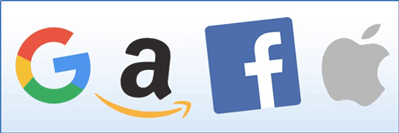The Big Four — Amazon, Apple, Facebook, and Google — have divvied up control of the digital world and our digital lives. Is it a conspiracy? Would it matter if it was? Center director Jeffrey Cole explains.
______________________________
By Jeffrey Cole
This never happened. But it is as if it did.
The resulting impact on our lives is exactly the same as if it had happened. And it makes one of the world’s great conspiracy theories.
 But it never happened.
But it never happened.
As I explored in a previous column, the big four — Amazon, Apple, Facebook, and Google — are each about 20 years old. Apple actually began in 1976, but the Apple that has become the world’s most valuable company began in 2003 when Steve Jobs introduced the iPod and iTunes. Amazon was founded a few years before 2000, but I’m rounding up. Google was founded about 18 years ago and Facebook about 14 years ago.
Within 15 years, they became four of the five biggest companies in the world. Consumers have a difficult time remembering life before them. All four companies (unless you are an Android phone user and don’t use a Mac) are an essential part of our everyday lives.
Our work at the Center shows that the average user looks at his or her smartphone as many as 125 times a day; 90 percent of teens sleep within an arm’s length of the phone. We search on Google countless times each day to check a fact, settle a bet, or look up anything that interests us. Facebook users check news feeds and post and check reactions to posts many times a day. And with Amazon Prime (and Prime Video), we are using Amazon every day of our lives.
We are so dependent on these companies that digital addiction is now becoming a recognized problem. At a recent developers’ conference, Apple discussed building tools into their products that would alert users when they were too preoccupied with their phones or the content on them. This sounds like letting the fox design the new chicken coop.
The big four have become bigger faster than any companies we have ever seen before. In previous eras it took an IBM, AT&T, or GE decades to have such a profound impact. The founders of the big four have become the wealthiest people in the world (Mark Zuckerberg just passed Warren Buffet to become the third richest person in the world).
All of this in the space of 20 years or so.
By 2008 (when Facebook began to eclipse MySpace), all four were well established and well on their ways to becoming the wealthy and powerful behemoths they are today.
The secret meeting that never happened
If we believe in conspiracy theories, it wouldn’t be much of a stretch to imagine a secret meeting, probably somewhere around 2008, in Silicon Valley. In attendance would have been Steve Jobs, Jeff Bezos, Larry Page, Sergey Brin, and the newest and youngest member, fresh from dropping out of Harvard, Mark Zuckerberg.
Actually, they probably would not have met in the Silicon Valley since there they were each immediately recognizable. Probably somewhere in the midwest.
_________________________________________________________________________________________________
Google, Amazon, Facebook, and Apple have by and large avoided trampling into each other’s businesses by staying in their core areas. But the leaving each other alone part is coming to an end.
_________________________________________________________________________________________________
Like the Allies at the end of the First or Second World Wars who divided up the political world, these big four could have carved out the digital world. They might have done so as follows:
Newbie Zuckerberg could have proposed, “We’ll be in charge of connecting everybody on the planet.” At that time he would have included the Chinese in his plan for social media world domination. He has come close. Facebook has 2.2 billion users out of about 3.7 billion people who could get Facebook (excluding the Chinese and non-internet users).
Brin and Page could have said, “We’ll be the ones that help anyone find anything they need on the internet.” If that was their goal, they succeeded brilliantly. Again, outside of China, in most countries Google is responsible for over 90 percent of all search.
Bezos could have chimed in, “We’ll sell everything to everyone.” Indeed they have. A recent study concludes that within two years Amazon will be the place where 50 percent of all online commerce in the United States takes place.
Steve Jobs could have finished carving up the digital world by saying, “We’ll make the devices that everyone will socialize, search with, and buy on.”
Their fictional plan was wildly successful.
Of the four, Apple is the only one that is not a monopoly. While Apple sells more phones in the U.S. than anyone (including Samsung, but some years it is neck and neck), worldwide Android as a system has more users than Apple’s IOS.
This conspiracy theory is not true (I hope). But the impact on business and our lives is exactly the same as if it really had happened. The big four have neatly and cooperatively carved up their own spheres of influence in the digital world. New entrants are finding it difficult to compete. Amazon and Google face nothing more than minor competition.
And to further the conspiracy theory, they have by and large avoided trampling into each other’s businesses by staying in their core areas. Google briefly owned a phone company (Motorola) and has dabbled in shopping. Amazon moved unsuccessfully into phones (Amazon Fire). Facebook has talked about a Facebook phone and has search functions within its platform. But, with a few, mostly unsuccessful exceptions, they leave each other alone.
All this makes for a great conspiracy theory, but the leaving each other alone part is coming to an end.
What’s next for the big four
All four see the extraordinary future and importance of voice. Whoever controls voice activation controls the home, the car and eventually the work place and school.
Apple was first with Siri on the iPhone. Amazon changed everything with the Echo (Alexa) in the home. Amazon has gained an enormous lead with many car manufactures (including Ford and Volkswagen), building compatibility into their devices whether cars, appliances or whatever. Google was slower but realized the importance of voice with its Google Assistant, and now with Google Home that directly competes with Alexa. Surprisingly, Apple, which was first with Siri, was much slower to introduce a competitor to Alexa and Home with the disappointing Home-Pod.
The big four are now aggressively moving into each other’s territories. A meeting to carve up the digital world never happened in 2008 or any year. But if it had, the results today would look exactly as if that meeting had occurred.
____________

Jeffrey Cole is the founder and director of The Center for the Digital Future at USC Annenberg.
See all columns from the Center.
July 18, 2018

